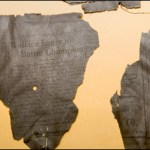History
I suddenly have this unaccountable urge to comment on the current issue of National Geographic Magazine. Maybe that isn't so strange. I mean, after all, I like reading the mag and I'm on record as saying, in the Swedish Skeptics quarterly no less, that my ideal museum exhibition would be a 3D version of a Nat Geo feature story. Though I wonder if that's the only reason. Well, anyway:
Nat Geo covers quite a bit of archaeology, usually of the same Great Civilisations and Opulently Furnished Tombs of Antiquity kind that we meet with in more specialised international pop-archaeomags such as…
It's grant crunch time, as the submission deadline for revised R01s is July 5. However, in a classic example of how electronic filing has actually made things more difficult, the grant has to be done and at the university grant office a week before the deadline if it is to be uploaded in time. So, my beloved Orac-philes, I'm afraid it's reruns one last time today, but, benevolent blogger that I am, I'll again post two on the same topic. As regular readers know, I've had a long history of combatting Holocaust denial online, but I also have a real problem when the price of combatting Holocaust…
It's grant crunch time, as the submission deadline for revised R01s is July 5. However, in a classic example of how electronic filing has actually made things more difficult, the grant has to be done and at the university grant office a week before the deadline if it is to be uploaded in time. So, my beloved Orac-philes, I'm afraid it's reruns one last time today, but, benevolent blogger that I am, I'll again post two on the same topic. As regular readers know, I've had a long history of combatting Holocaust denial online, but I also have a real problem when the price of combatting Holocaust…
I've written before (1 - 2 - 3) about the Kenyan village with a poorly supported and recently concocted origin myth involving Medieval Chinese sailors. Now my buddy Axel Andersson has alerted me to a similar case. But here it's sort of the other way around: a Chinese village with a poorly supported and recently concocted origin myth involving Roman soldiers.
The village of Zhelaizhai (formerly Liqian) is in Gansu province in northern China, on the border towards Inner Mongolia and on the edge of the Gobi desert. People here tend to have an unusually Europid appearance by Chinese standards,…
It takes decades, though. When did you last hear anyone seriously advocate a flat earth? How many Republican presidential candidates would raise their hands if asked if they believed the earth was flat? Sure, you can find a few far out fringe cranks who babble about it, just as there are a few geocentrists around, but it's a dead idea — not even Ken Ham pushes it, although I am wondering, since the Bible does support it literally, whether he doesn't secretly suspect the astronomers have been lying to him for all these years.
But there used to be more noisy flat-earthers around. A complete…
I left off yesterday with the initial discovery of "Vero toxin," a toxin produced by E. coli (also called "Shiga toxin" or "Shiga-like toxin"). Though this may initially seem unconnected to hemolytic uremic syndrome (HUS), the discovery of this cytotoxin paved the way for a clearer understanding of the etiology of this syndrome, as well as the mechanisms by which disease progressed. By the early 1980s, several lines of research pointed toward E. coli, and particularly O157:H7, as the main cause of HUS.
A 1982 Centers for Disease Control and Prevention MMWR report found a rare E. coli…
Launching from my discussion with Muslim wackjobs in Dublin, this video takes my casual conversation and fleshes it out with details and references. Hey, looks like I was right!
Hair breaks. It singes. It falls out. It might not be the strongest feature of living human bodies, but hair is one of the best-preserved tissues of dead ones, providing a record of diet, age, metabolism, and, sometimes, even the cause of death.
Ferdinand II*
With intense beams of x-rays at Brookhaven's National Synchrotron Light Source (NSLS), a team of researchers is using hair samples collected from the decomposed bodies of two 15th century Italian royalty to determine how they really died.
The subjects: Ferdinand II (1467-1496)* and Isabella (1470-1524) of Aragon, a medieval kingdom…
It's not every day that you read about measuring skulls in the contemporary scientific literature. It's kind of a quaintly old-timey, quaintly racist kind of thing to do. But here we are, with a brand new paper about skull measuring in PLoS Biology. Already quite a few blog-words have been written in support of this new paper, which disproves Stephen Jay Gould's assertion in The Mismeasure of Man that George Morton's 1839 skull measurements were fudged intentionally or unintentionally by his racist bias.
I haven't read a lot of Gould, and I'm pretty convinced by the numbers in the paper…
At the new blog Puff the Mutant Dragon, there's a great pair of posts looking at the history of plague, with a focus on outbreaks that have occurred here in the US.
Bubonic Plague in America, Part I: LA Outbreak
Bubonic Plague in America, Part II: Undercover Science
I'll also link them in my Black Plague series.
In the United States, we tend to take our clean drinking water for granted. Even though there are periodic concerns which bubble up about pharmaceuticals or other chemicals in our water supply, we typically believe--with good reason--that we have little to fear when it comes to contamination from microbes. Our drinking water, while far from perfect, is heads and shoulders above what it once was--something many of us forget or have never realized. There have been notable breakdowns, such as the 1993 outbreak of Cryptosporidium in Milwaukee that sickened over 400,000 individuals, but these days…
This is a video produced in the 1960s to illustrate life in the 1990s. Nerds will find hilarity in the computer interfaces, women will rage at the gender stereotypes.
Chinese tourist sites follow a set of conventions that seem to go back hundreds or thousands of years, far into a past when tourism, as we understand it, did not yet exist. Essentially we're dealing with named and inscribed sites. I have visited many in my Chinese travels, but since I can't read the language I have formed my ideas about them from reading English-language signage and asking my wife to translate or explain. So I may have misunderstood the nuances. Here nevertheless are my impressions.
A Chinese tourist site always originates with an educated male member of the elite some time…
Five years before becoming fully operational, Brookhaven's National Synchrotron Light Source II (NSLS-II) already is leading to discoveries -- of the historical kind.
Pieces of newspaper dug up at the NSLS-II construction site, which include a story about a boxing match scheduled for October 2, 1917 - Tommy Tuohey versus Ed Wallace
As earthwork takes place on the NSLS-II construction site, which housed part of the U.S. Army's Camp Upton in the World War I and II era, artifacts ranging from rusted horseshoes to nearly 100-year-old pieces of newspaper are being dug up.
One of the most…
My colleague Karl-Magnus Melin specialises in ancient and modern woodworking and has a major paper in Fornvännen's summer issue about well fittings made from hollowed-out tree trunks. He's kindly sent me some post-conservation pics of a Viking Period wooden drinking bowl. It's lathe-turned unless I'm very much mistaken. The bowl was found sitting in a back-filled well last autumn, during excavations directed by Anne Carlie for the National Heritage Board at Lindängelund near Malmö.
Waterlogged wood is a bit like precious metal in that little really happens to it as the centuries pass.…
Recently, there have been grumblings in the ranks of Orac-philes. All is not entirely well. Or, at least, all is less well than usual. Even more unusual, I feel your pain. I really do. We've been enduring a stretch when the anti-vaccine movement has been unusually busy for an unusually long time, leading vaccines to take over and dominate as the main topic of this blog for more than the last week. This has led not only to my getting tired of the topic, but to some of you apparently becoming tired as well of the sheer burning stupid that only the anti-vaccine movement can lay down with such…
While I've got a few more review copies backlogged around here, the next book review post is one that I actually paid for myself, Lawrence Krauss's Quantum Man: Richard Feynman's Life in Science, part of Norton's Great Discoveries series of scientific biographies. I'm a fan of the series-- past entries reviewed here include Richard Reeves's biography of Rutherford, Rebecca Goldstein's biography of Goedel, and David Foster Wallace on Cantor's work on infinity (which is less of a biography than the others). I'm not a huge reader of biographies, but I've liked all the books from this series that…
Journalist Geoffrey York has dug deeper for the Globe and Mail into the story about alleged descendants of Medieval Chinese sailors on the coast of Kenya that I wrote about once in '07. He finds that not even the locals, who supposedly tell "legends" about their Chinese ancestry, believe any of it or indeed know of any such legends prior to the recent foreign involvement. He quotes me, but it's a good piece anyway.
Next to Ebola, my favorite virus would probably be smallpox (Variola virus). I mean, now that it's eradicated in nature, what's not to love about the mysteries it's left us--where it came from, why it was so deadly (or, not so deadly, as in the emergence of the "mild" form, variola minor), and will a new poxvirus emerge to take its place? The topic is particularly germane since the debate still rages on about the fate of the world's smallpox stocks. Smallpox has killed untold millions and influenced the destiny of societies; and as Michael Willrich details in his new book, Pox: An American…
Sometimes I complain on this blog about grammar Nazis. I had no idea at the time that grammar Nazis might actually be a real phenomenon.
Of course, I'd be dead because my unedited material all too frequently contains multiple run-on sentences. True, I almost always find them later when I reread my posts and then fix them, but in the few hours after such posts "go live" they often sit there, uncorrected. Oh, well, it is blogging, and I don't have an editor other than myself.
Now watch: Based on this video, everybody's favorite anti-vaccine apologist who keeps reminding us he is not "anti-…


